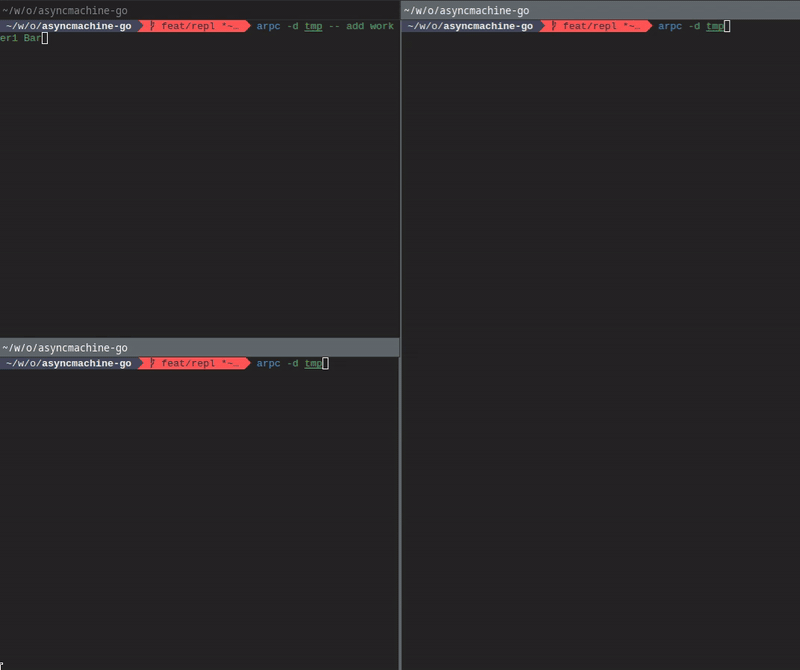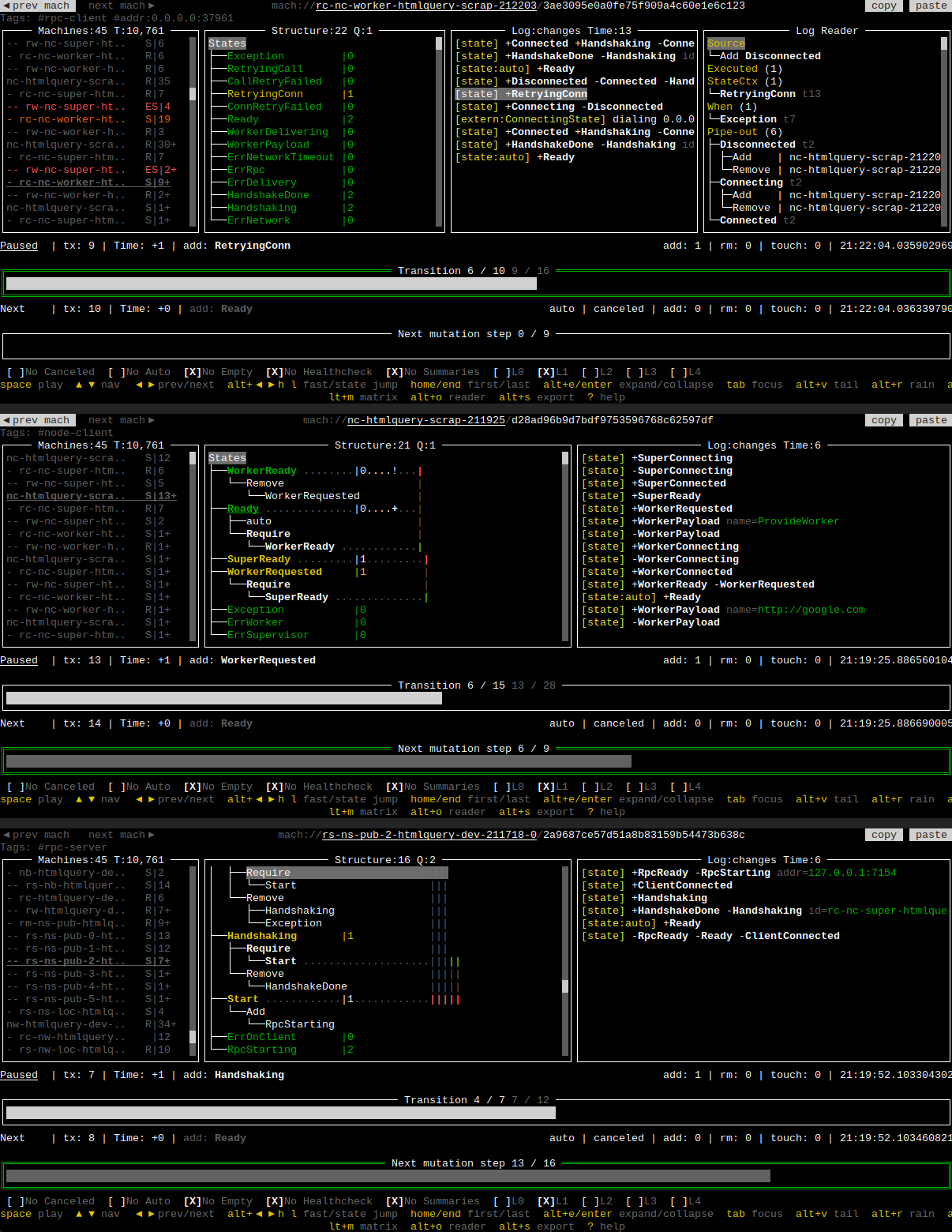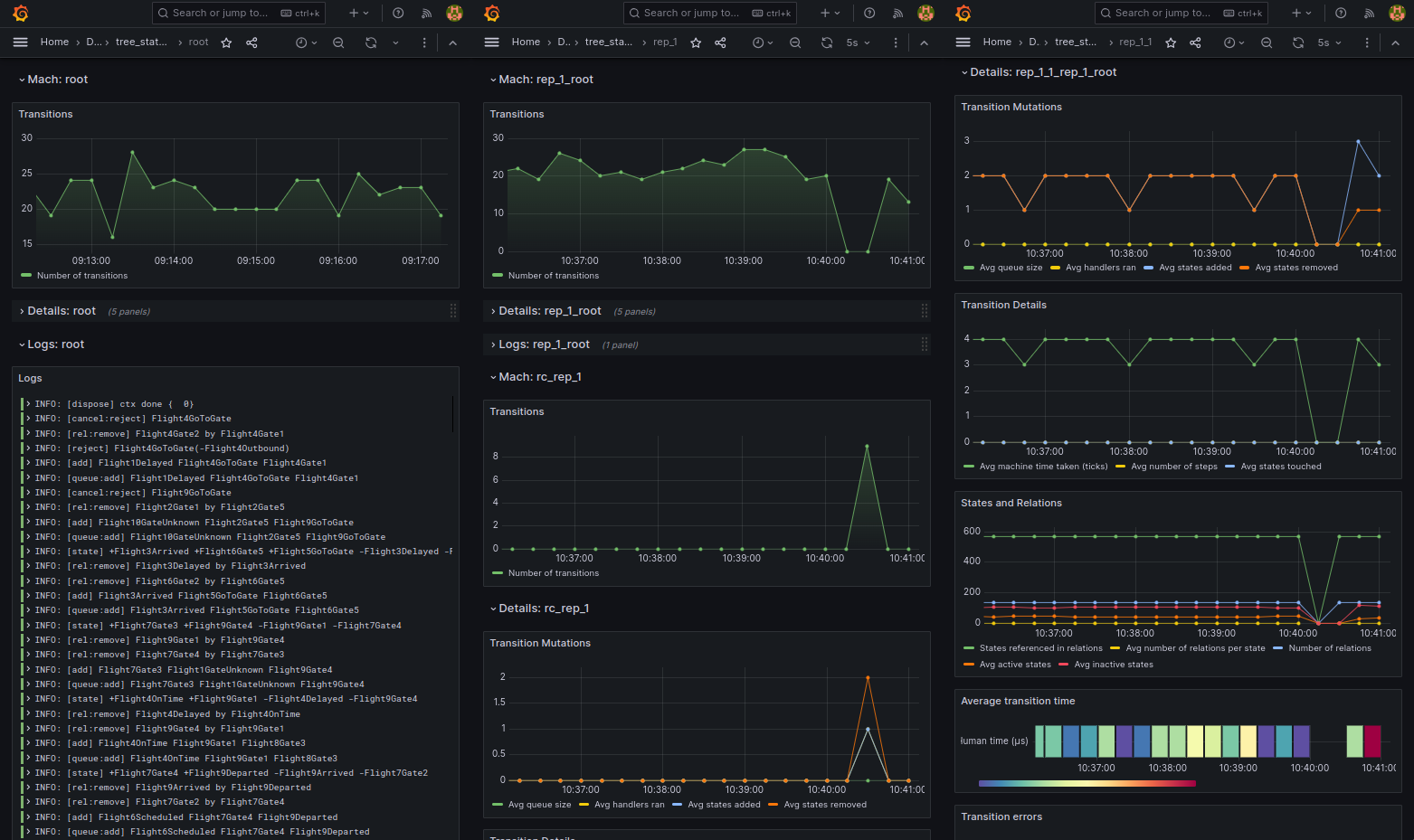
Note
State machines communicate through states.
asyncmachine-go is a batteries-included graph control flow library implementing AOP and Actor Model through a clock-based state-machine. It features atomic transitions, relations with consensus, transparent RPC, TUI debugger, telemetry, REPL, remote workers, and diagrams.
As a control flow library, it decides about running of predefined bits of code (transition handlers) - their order and which ones to run, according to currently active states (flags). Thanks to a novel state machine, the number of handlers can be minimized while maximizing scenario coverage. It's lightweight, fault-tolerant by design, has rule-based mutations, and can be used to target virtually any step-in-time, in any workflow. It's a low-level tool with acceptable performance.
asyncmachine-go takes care of context, select, and panic, while allowing for graph-structured concurrency
with goroutine cancelation. The history log and relations have
vector formats. It aims to create autonomous workflows with organic control flow and stateful APIs.
- binary flag
- node with relations
- AOP aspect
- logical clock
- subscription topic
- multiple methods
- metric
- trace
- lock
- breakpoint
Besides the main use-case of workflows, it can be used for stateful applications of any size - daemons, UIs, configs, bots, firewalls, synchronization consensus, games, smart graphs, microservice orchestration, robots, contracts, streams, DI containers, test scenarios, simulators, as well as "real-time" systems which rely on instant cancelation.
Note
Flow is state, and state is flow, in a graph.
Minimal - an untyped definition of 2 states and 1 relation, then 1 mutation and a check.
import am "github.com/pancsta/asyncmachine-go/pkg/machine"
// ...
mach := am.New(nil, am.Schema{
"Foo": {Require: am.S{"Bar"}},
"Bar": {},
}, nil)
mach.Add1("Foo", nil)
mach.Is1("Foo") // falseComplicated - wait on a multi state (event) and the Ready state with a 1s timeout, then mutate with typed args, on top of a state context.
// state ctx is an expiration ctx
ctx := client.Mach.NewStateCtx(ssC.WorkerReady)
// clock-based subscription
whenPayload := client.Mach.WhenTicks(ssC.WorkerPayload, 1, ctx)
// state mutation
client.WorkerRpc.Worker.Add1(ssW.WorkRequested, Pass(&A{
Input: 2}))
// WaitFor* wraps select statements
err := amhelp.WaitForAll(ctx, time.Second,
// post-mutation subscription
mach.When1(ss.BasicStatesDef.Ready, nil),
// pre-mutation subscription
whenPayload)
// check cancelation
if ctx.Err() != nil {
return // state ctx expired
}
// check error
if err != nil {
// error state mutation
client.Mach.AddErr(err, nil)
return // no err required
}
// client/WorkerPayload and mach/Ready activatedNote
Clock-based navigation in time.
Handlers - Aspect Oriented transition handlers.
// can Foo activate?
func (h *Handlers) FooEnter(e *am.Event) bool {
return true
}
// with Foo active, can Bar activate?
func (h *Handlers) FooBar(e *am.Event) bool {
return true
}
// Foo activates
func (h *Handlers) FooState(e *am.Event) {
h.foo = NewConn()
}
// Foo de-activates
func (h *Handlers) FooEnd(e *am.Event) {
h.foo.Close()
}Schema - states of a node worker.
type WorkerStatesDef struct {
ErrWork string
ErrWorkTimeout string
ErrClient string
ErrSupervisor string
LocalRpcReady string
PublicRpcReady string
RpcReady string
SuperConnected string
ServeClient string
ClientConnected string
ClientSendPayload string
SuperSendPayload string
Idle string
WorkRequested string
Working string
WorkReady string
// inherit from rpc worker
*ssrpc.WorkerStatesDef
}All examples and benchmarks can be found in /examples.
- 🦾
/pkg/machineis the main package /pkg/nodeshows a high-level usage- examples in
/examplesare good for a general grasp- with
/examples/mach_templatebeing ready for copy-paste
- with
/docs/manual.mdand/docs/diagrams.mdgo deeper into implementation details/tools/cmd/am-genwill bootstrap/tools/cmd/am-dbgwill record every detail- and reading tests is always a good idea
This monorepo offers the following importable packages, especially:
- 🦾
/pkg/machineState machine, dependency free, semver compatible. /pkg/statesReusable state schemas, handlers, and piping./pkg/helpersUseful functions when working with async state machines./pkg/telemetryTelemetry exporters for dbg, metrics, traces, and logs.
Other packages:
/pkg/rpcRemote state machines, with the same API as local ones./pkg/historyHistory tracking and traversal, including KV and SQL./pkg/integrationsNATS and other JSON integrations./pkg/graphMultigraph of interconnected state machines./pkg/nodeDistributed worker pools with supervisors./pkg/pubsubDecentralized PubSub based on libp2p gossipsub.
/tools/cmd/am-dbgMulti-client TUI debugger./tools/cmd/am-genGenerates schema files and Grafana dashboards./tools/cmd/arpcNetwork-native REPL and CLI./tools/cmd/am-visGenerates D2 diagrams./tools/cmd/am-relayRotates logs.
Note
Inspecting cause-and-effect in distributed systems.
- secai AI Agents framework.
- arpc REPL Cobra-based REPL.
- am-dbg TUI Debugger Single state-machine TUI app.
- libp2p PubSub Simulator Sandbox simulator for libp2p-pubsub.
- libp2p PubSub Benchmark Benchmark of libp2p-pubsub ported to asyncmachine-go.
- scale up, not down
- defaults work by default
- everything can be traced and debugged
- automation is evolution
- state != data

Under development, status depends on each package. The bottom layers seem prod grade, the top ones are alpha or testing.
Note
Managing distributed concurrency.
- before
./scripts/dep-taskfile.shtask install-deps
- after
task testtask formattask linttask precommit- good first issues
- history layer - SQL, KV, ...
am-relaytool for proxying, conversions, duck-taping- RPC handlers for distributed state-machines
- ROADMAP.md
It calls struct methods according to conventions, a schema, and currently active states (eg BarEnter, FooFoo,
FooBar, BarState). It tackles nondeterminism by embracing it - like an UDP event stream with structure.
State is a binary ID as in status / switch / flag, eg "process RUNNING" or "car BROKEN".
Each state has a counter of activations & deactivations, and all state counters create "machine time". These are logical clocks, and the queue is also (partially) counted.
The same event happening many times will cause only 1 state activation, until the state becomes inactive.
The complete FAQ is available at FAQ.md.
Note
Don't lose your sync.













